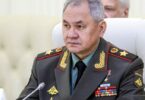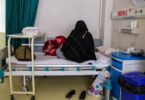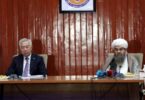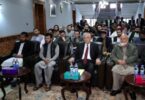KABUL (Pajhwok): Foreign Minister Hanif Atmar has briefed ambassadors and representatives of neighbouring countries on the latest political and security developments in Afghanistan. Areas of cooperation between the government of Afghanistan and the international community also came up for discussion at meeting, the Ministry of Foreign Affairs said in a statement.
Atmar shared with his interlocutors information on six main areas — the security situation, the presence of foreign militants fighting alongside the Taliban, dire humanitarian conditions, Taliban’s widespread crimes and human rights violations, the government’s new security plan and main areas of cooperation with the international community. He went on to say that the rise of the Taliban’s bloody attacks in recent months had killed more than 3,000 people, displaced more than 300,000, and disrupted order and provision of services in half of the country’s districts. Currently, 18 million people face dire humanitarian situation.
Minister Atmar noted that the Taliban attacks were carried out in direct collusion with more than 10,000 regional terrorists from Lashkar-e-Taiba (LeT), Tehreek-e-Taliban Pakistan (TTP), Ansarullah, Jundallah, al-Qaeda, East Turkestan Islamic Movement (ETIM), and the Islamic Movement of Uzbekistan (IMU). Minister Atmar said the Taliban’s war crimes were indescribable, referring to the massacre of more than 100 people in Spin Boldak, forced marriages, destruction of more than 300 public infrastructures, and suspension of services in Taliban-controlled areas.
Foreign Minister Atmar also highlighted the Afghan government’s security plans and regional and global diplomacy. He said the Afghan government’s security plan would be charted out and implemented soon in coordination and support of all political and social strata to strengthen the government’s positions in strategic points and metropolitans. He also highlighted the joint program of the Afghan government and human rights organizations to document the Taliban’s crimes and hold them accountable worldwide. Atmar elaborated on four areas of cooperation with the global fraternity — repelling Taliban’s attacks on main cities, preventing a human catastrophe and human rights abuses, accelerating the Afghan peace Process and implementing a six-month security plan.
Representatives of regional countries and the United Nations expressed their support for an immediate cessation of violence and strengthening the peace process. UN Secretary-General’s Special Representative Deborah Lyons said the attack in on the UNAMA office in Herat showed that Taliban’s actions did not reflect commitments. She added: “This is not just Afghanistan’s struggle, but a struggle that we should all pay serious attention to.”






